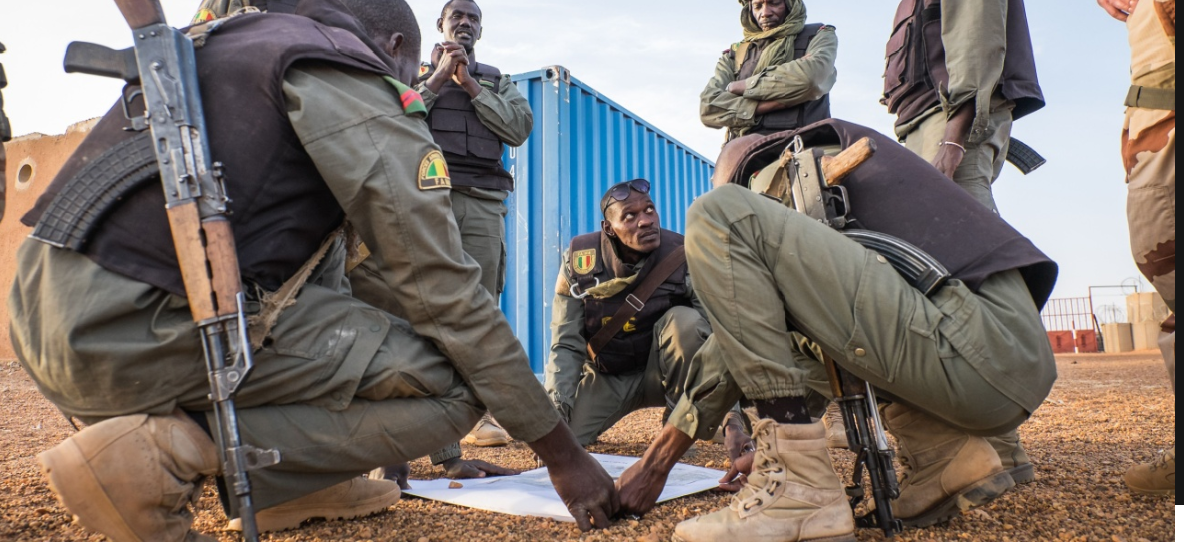Is Russia’s African Presence Winding Down?

Russia’s proxies have few solutions to offer when tackling West Africa and the Sahel’s problems.
On July 28, 2024, dozens of Wagner fighters were killed in an ambush by Tuareg rebels on the outskirts of the northern Mali town of Tinzaouaten, located along the border with Algeria. The most significant military defeat suffered by Wagner in Africa, the incident served as a clear indication of the intense challenges facing Russian mercenaries in their security operations under the beating sun and arid terrain of the Sahel.

Less than a year later, on June 7, 2025, the Wagner Group—a Kremlin-backed mercenary group that had been providing security support to governments in the Sahel for years—announced that it would withdraw from Mali.
This is the surest sign yet that the end of Western security assistance to Sahelian countries has not paved the path for Russia’s inevitable domination of the region through counterterrorism and security assistance. Like France, the United States, and other players that have provided military assistance to local governments in their fight against armed groups and rebels over the past decade, Russia, too, has failed to contain the various insurgencies.
All of this suggests that the US government should not be concerned that a reduction in its on-the-ground security presence in the region will necessarily strengthen Russia’s position. Russia’s presence across the region has indeed been significant in recent years. Both Wagner and the Africa Corps—a separate paramilitary group more directly controlled by Russia’s government—have provided security support to the three Sahel junta governments: Mali, Niger, and Burkina Faso. In exchange, the Russian mercenaries receive access to the region’s natural resources. These include timber and diamonds, which provide billions of dollars in revenue to Russia’s coffers.
Wagner’s retreat from Mali, however, doesn’t signal an end to Russia’s security work in the Sahel. The Africa Corps will remain active, and Sahelian governments will continue to rely on Russian assistance in their fight against armed groups that threaten the region’s security.
However, due to growing Russian frustration over the losses suffered in its Sahelian campaign, the style of this support is likely to shift. In contrast with Wagner, Africa Corps focuses less on offensive and kinetic military activity. Instead, it centers its work on safer activities focused on improving the functioning of the countries’ militaries, which it is supporting, such as through training, the sale and transportation of military equipment, and logistical support for local militaries.
Russia is already involved in this type of support and is likely to focus on it moving forward. An analysis by Radio France International (RFI), for example, found that Russians are using a port in Guinea, on Africa’s western coast, to receive shipments of military equipment that they are then transporting northward to the Sahel.
Recent reporting also indicates that the Russians are stationing military personnel and equipment at the Al-Khadim air base in Libya and are using the base as a staging ground for their activities in the Sahel. The Russians have transported some military equipment to this Libyan base from two bases they were previously using in Syria.
Outside of its operations in the Sahel, Russia is also trying to replace Wagner in the Central African Republic (CAR). On August 6, Russia requested that the CAR government replace Wagner with the Africa Corps and shift its payments from minerals to cash, which would provide it with a more liquid form of compensation.
Despite having expanded their operations and having committed thousands of mercenaries to the region in recent years, the Russians have been unable to solve the security challenges across West and Central Africa. They are increasingly confronted with opposition from locals for their human rights abuses and failure to repel armed groups.
Although the Russians’ primary goal in the region isn’t as much to end armed group aggression as it is to receive payment for its services, which it can then spend on its war in Ukraine (much of this payment comes in the form of access to the region’s minerals), its failure to improve the region’s security situation has caused the region’s local population and local militaries to become increasingly disgruntled by Russia’s presence there.
Despite the security assistance offered by Russian mercenaries to combat extremist groups, the Islamic State and Jama’at Nusrat al-Islam wal-Muslimin (JNIM), among others, continue to spread southward, threatening the security and safety of private citizens, visitors, military personnel, and governments across the region.
Nigeria is fighting increasingly deadly militant extremists in its north, which are partly fueled by the chaos in the three junta states. Meanwhile, although the surrounding countries of Mauritania, Senegal, Guinea, Togo, Benin, and Côte d’Ivoire are fairly stable, they’re experiencing increasing threats of violence from militant groups that are seeping out from the central Sahel. And Chad is experiencing an escalating insurgency from violent militants as well as increasing internal tensions between its nomadic peoples and farmers. Chad is also housing 1.8 million refugees from surrounding countries, particularly Sudan, putting further pressure on the state’s resources.
Russia’s inability to stop the spread of terrorism and internal turmoil in these countries follows in the wake of Western players’ inability to do the same. The West’s previous failure to stem instability, combined with the rapid deterioration in relations between Western countries historically involved in the region—most notably France and the United States—and several Sahelian countries, is evidence enough that the West cannot expect that any attempt to replace Russia’s military activity in the region with its own would be successful.
The baggage of colonialism and neocolonialism has hindered the relationship Western states have with Sahelian governments, many of whom view France’s imperial tendencies, in particular, and those of the United States to a lesser extent, as responsible for many of the economic and security challenges they currently face.
Western states have struggled to sustain their relationship with the region’s junta governments in the aftermath of the coups. Wired to argue for greater democratic norms, Washington and Paris have faced opposition from iron-fisted leaders uninterested in ceding power. For these praetorian states, it is less cumbersome to do business with Russia, which has no interest in promoting democracy across Africa, than to respond to the West’s demands for greater democratic openness in exchange for diplomatic, security, and economic support.
As a result, several Sahelian states, including Niger, Mali, and Senegal, have expelled the US and French militaries from their territory.
Despite the decrease in a militarized, on-the-ground presence in the Sahel and surrounding areas of West Africa resulting from this forced removal, the United States has maintained a more limited security support, focusing on building the security capacity of local actors, primarily through training exercises. Between 2001 and 2021, the US provided $3.3 billion in security assistance to the Sahel.
The major US security assistance program in the region is the Trans-Saharan Counter Terrorism Partnership (TSCTP), which has been active since 2005. The purpose of the TSCTP is to build the capability of the militaries and law enforcement agencies in North and West African countries to undertake counterterrorism operations, maintain border security, and strengthen the rule of law.
The TSCTP aims to achieve these goals through military programs, such as Operation Juniper Shield, which provides training, equipment, and intelligence support to Sahelian militaries. The security program includes an economic component that aims to prevent vulnerable populations from falling into extremism.
The largest US military exercise in Africa is African Lion, which has taken place annually since 2004. The latest African Lion exercise included over 10,000 troops across forty participating nations, as well as multiple observer countries spread across four host nations.
Perhaps the most significant American-led annual training in West Africa is Operation Flintlock. Starting in 2005, this is Africa Command’s largest annual special forces exercise. Flintlock takes place in or near the Sahel region, with participating African nations of the TSCTP, as well as international, US, and NATO Special Operations forces.
Operation Flintlock’s purpose is to strengthen the capabilities of partnered African nations in countering violent extremist organizations, to provide security, to facilitate collaboration across borders, to build trust with civilian populations, and to share information across partner countries. This year’s exercise—hosted in Côte d’Ivoire—involved 500 troops from over thirty different countries.
Ultimately, American interests in the region are limited. Alex Thurston, a Sahel expert at the University of Cincinnati, told the authors in an interview that there’s a “US interest in containing instability, but I don’t know that the trajectory is such that jihadists are going to be knocking on the door of Accra [Ghana] or Abidjan [Cote d’Ivoire] any time soon.” According to Thurston, the militants in the Sahel are unable to attack the United States, and for the most part have no desire to do so.
As long as no American military personnel are placed in harm’s way in the Sahel, the United States’ security interests in the region are not significant.
The limited interests extend to economic considerations. The region’s economic output and trade with the United States are such that any drop in its trade with the United States would have an insignificant effect on the American economy. US goods trade with the West African economic community, ECOWAS, in 2022 totaled $16.1 billion. With US total trade in 2023 totaling nearly $4.9 trillion, neither trade with the western Sahel nor with West Africa makes up a significant portion of the total. American economic interests are therefore not strongly tied to the region’s security situation.
This is not to say that the United States has no interests in the region. The Trump administration has made clear its desire to access minerals found throughout Africa. Although not as mineral-rich as regions like the Democratic Republic of the Congo and the Sahel, West Africa is home to critical minerals that can be utilized by various important American industries, including electric vehicles, batteries, and industrial appliances. Violence in the region hinders the United States’ ability to access these minerals or invest in infrastructure projects that could improve the logistical efficiency of shipping minerals from mining cities to coastal ports.
The United States also has an interest in ensuring that armed group activity doesn’t spread far beyond the Sahel region, where it would threaten to topple the governments of surrounding countries, many of which are close partners to the United States.
The current US policy of centering support for Sahelian and West African security efforts on training exercises rather than on-the-ground military confrontations with armed groups is indeed the right approach. US policy also allows for continued US intelligence sharing with partner countries in the region, like Togo. This ensures that Washington is utilizing its resources to support the efforts of partner countries in countering insurgencies.
Despite Russia’s active military engagement in the Sahel over the past few years, the withdrawal of the Wagner Group from Mali, the losses suffered by Wagner fighters, and the proliferation of violence across the region serve as evidence that Russia has struggled similarly to the ways Western players had in their security operations across the Sahel over the past decade.
The West’s previous failure in halting the spread of violence in the region, combined with the United States’ limited interests in the region, signal that it should move forward with the current, more limited security support to partner countries, centered on intelligence sharing and training, rather than kinetic military activity.
- Questions and Answers
- Opinion
- Motivational and Inspiring Story
- Technology
- Live and Let live
- Focus
- Geopolitics
- Military-Arms/Equipment
- Beveiliging
- Economy
- Beasts of Nations
- Machine Tools-The “Mother Industry”
- Art
- Causes
- Crafts
- Dance
- Drinks
- Film/Movie
- Fitness
- Food
- Spellen
- Gardening
- Health
- Home
- Literature
- Music
- Networking
- Other
- Party
- Religion
- Shopping
- Sports
- Theater
- Health and Wellness
- News
- Culture

